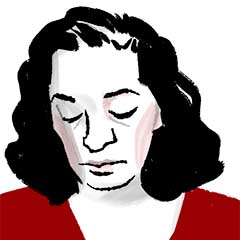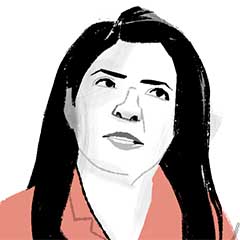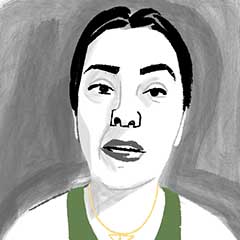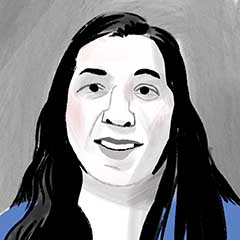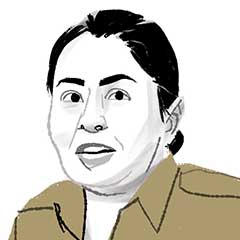Part 5
A New Path Forward
After being attacked and threatened for attending anti-government protests in 2022, Zhina fled Iran to the Iraqi side of the Kurdish region.
By Heather Murdock and Brian Williamson | VOA News
Additional reporting by Halan Akoiy

“I shaved my hair the first day of the protests.”
“It wasn’t about not wanting to wear headscarves.”
Zhina
a 32-year-old Kurdish Iranian living in Iraq
“But can you imagine someone’s hair could be a reason for their death?”
The 2022 death of Mahsa Amini, a 22-year-old Iranian Kurd, whose Kurdish name was Jina, led to protests in Iran and around the world. Before Amini's death, Zhina says she always followed her family's orders.
“I suffered a lot from my family and the Iranian regime. Women are objects, according to the government.”
“My family forced me to get married at the age of 13. They forced me to quit school.”
“He was 33, and I was 13. I had my son at 15.”
“I’m shocked now when I think about that time. I wonder, ‘How did I survive that?’”
“I visited the court for seven years but didn’t manage to get a divorce.”
“They would not let me, because only the man has the right to divorce.”
“My family didn’t support me, because divorce was taboo.”
“My husband fought with me when I shaved my hair.”
“He said,
‘Why the hell did you shave your hair?’
‘ ... why do you want to follow such women?’ "
“He locked the door behind him when he left the house in the mornings.”
“But I would break the lock and go out.”
“I did not encounter the morality police, because my family was very religious.”
“If I went out, I had to wear clothes that followed their restrictions.”
No makeup.
Clothes should not be tight, short or revealing.
Clothes had to cover from head to toe.
But when Amini died in the custody of the morality police, everything changed.
“I was going to work two days a week as a nurse in a clinic.”
“But when we saw on social media that Jina was murdered, I went to the cemetery, even though the government did not want people to go.”
Original photograph by Niloofar Hamedi
“Her body was brought back to the city of Saqqez, and the government threatened her family to keep quiet.”
Saqqez
Tehran
Iran
Iraq
Saudi
Arabia
“People started going to the graveyard around midnight. The government blocked the roads and tried to keep the time of her body’s arrival a secret.”
What started as a funeral march quickly exploded into protests across the country and around the world.
Over the next few months, hundreds of protesters were killed as the government responded to cries for “Women, Life and Liberty” with deadly violence.
Teenage schoolgirls joined the fray, marching and protesting online.
Amnesty International reported 22,000 people detained, including children being held and tortured.
In the year since she was murdered, the name “Mahsa Amini” has been repeated around the world.
But her Kurdish name is Jina.
Kurdish women from Iran say it is important to them that she be remembered by this name.
They say being forced to take Iranian names for legal purposes is just one of many injustices imposed upon Kurdish people.
“On the first day, the government did not shoot at people. They only told people to go home, otherwise they would shoot.”
“I was wounded on the fourth day.”
“I felt that somebody hit me from behind, and I fell on the ground.”
“I did not know what it was until I stood up and my friend told me that I was stabbed with a knife. I got 17 stiches."

“I shaved my hair the first day of the protests.”
“It wasn’t about not wanting to wear headscarves.”
Zhina
a 32-year-old Kurdish Iranian living in Iraq
“But can you imagine someone’s hair could be a reason for their death?”
The 2022 death of Mahsa Amini, a 22-year-old Iranian Kurd, whose Kurdish name was Jina, led to protests in Iran and around the world. Before Amini's death, Zhina says she always followed her family's orders.
“I suffered a lot from my family and the Iranian regime. Women are objects, according to the government.”
“My family forced me to get married at the age of 13. They forced me to quit school.”
“He was 33, and I was 13. I had my son at 15.”
“I’m shocked now when I think about that time. I wonder, ‘How did I survive that?’”
“I visited the court for seven years but didn’t manage to get a divorce.”
“They would not let me, because only the man has the right to divorce.”
“My family didn’t support me, because divorce was taboo.”
“My husband fought with me when I shaved my hair.”
“He said,
‘Why the hell did you shave your hair?’
‘ ... why do you want to follow such women?’ "
“He locked the door behind him when he left the house in the mornings.”
“But I would break the lock and go out.”
“I did not encounter the morality police, because my family was very religious.”
“If I went out, I had to wear clothes that followed their restrictions.”
No makeup.
Clothes should not be tight, short or revealing.
Clothes had to cover from head to toe.
But when Amini died in the custody of the morality police, everything changed.
“I was going to work two days a week as a nurse in a clinic.”
“But when we saw on social media that Jina was murdered, I went to the cemetery, even though the government did not want people to go.”
Original photograph by Niloofar Hamedi
“Her body was brought back to the city of Saqqez, and the government threatened her family to keep quiet.”
Turkmenistan
Saqqez
Tehran
Iran
Iraq
Saudi
Arabia
“People started going to the graveyard around midnight. The government blocked the roads and tried to keep the time of her body’s arrival a secret.”
What started as a funeral march quickly exploded into protests across the country and around the world.
Over the next few months, hundreds of protesters were killed as the government responded to cries for “Women, Life and Liberty” with deadly violence.
Teenage schoolgirls joined the fray, marching and protesting online.
Amnesty International reported 22,000 people detained, including children being held and tortured.
In the year since she was murdered, the name “Mahsa Amini” has been repeated around the world.
But her Kurdish name is Jina.
Kurdish women from Iran say it is important to them that she be remembered by this name.
They say being forced to take Iranian names for legal purposes is just one of many injustices imposed upon Kurdish people.
“On the first day, the government did not shoot at people. They only told people to go home, otherwise they would shoot.”
“I was wounded on the fourth day.”
“I felt that somebody hit me from behind, and I fell on the ground.”
“I did not know what it was until I stood up and my friend told me that I was stabbed with a knife. I got 17 stiches."

“I shaved my hair the first day of the protests.”
“It wasn’t about not wanting to wear headscarves.”
“But can you imagine someone’s hair could be a reason for their death?”
“I suffered a lot from my family and the Iranian regime. Women are objects, according to the government.”
The 2022 death of Mahsa Amini, a 22-year-old Iranian Kurd, whose Kurdish name was Jina, led to protests in Iran and around the world. Before Amini's death, Zhina says she always followed her family's orders.
“My family forced me to get married at the age of 13. They forced me to quit school.”
“He was 33, and I was 13. I had my son at 15.”
“I’m shocked now when I think about that time. I wonder, ‘How did I survive that?’”
“I visited the court for seven years but didn’t manage to get a divorce.”
“They would not let me, because only the man has the right to divorce.”
“My family didn’t support me, because divorce was taboo.”
“My husband fought with me when I shaved my hair.”
“He said,
‘ ... why do you want to follow such women?’ "
‘Why the hell did you shave your hair?’
“But I would break the lock and go out.”
“He locked the door behind him when he left the house in the mornings.”
“If I went out, I had to wear clothes that followed their restrictions.”
“I did not encounter the morality police, because my family was very religious.”
Clothes should not be tight, short or revealing.
No makeup.
Clothes had to cover from head to toe.
“I was going to work two days a week as a nurse in a clinic.”
But when Amini died in the custody of the morality police, everything changed.
“But when we saw on social media that Jina was murdered, I went to the cemetery, even though the government did not want people to go.”
Original photograph by Niloofar Hamedi
“People started going to the graveyard around midnight. The government blocked the roads and tried to keep the time of her body’s arrival a secret.”
“Her body was brought back to the city of Saqqez, and the government threatened her family to keep quiet.”
Turkmenistan
Saqqez
Tehran
Iran
Iraq
Saudi
Arabia
What started as a funeral march quickly exploded into protests across the country and around the world.
Over the next few months, hundreds of protesters were killed as the government responded to cries for “Women, Life and Liberty” with deadly violence.
Amnesty International reported 22,000 people detained, including children being held and tortured.
Teenage schoolgirls joined the fray, marching and protesting online.
In the year since she was murdered, the name “Mahsa Amini” has been repeated around the world.
But her Kurdish name is Jina.
Kurdish women from Iran say it is important to them that she be remembered by this name.
They say being forced to take Iranian names for legal purposes is just one of many injustices imposed upon Kurdish people.
“On the first day, the government did not shoot at people. They only told people to go home, otherwise they would shoot.”
“I was wounded on the fourth day.”
“I felt that somebody hit me from behind, and I fell on the ground.”
“I did not know what it was until I stood up and my friend told me that I was stabbed with a knife. I got 17 stiches."

“But can you imagine someone’s hair could be a reason for their death?”
“It wasn’t about not wanting to wear headscarves.”
“I shaved my hair the first day of the protests.”
Zhina
a 32-year-old Kurdish Iranian living in Iraq
The 2022 death of Mahsa Amini, a 22-year-old Iranian Kurd, whose Kurdish name was Jina, led to protests in Iran and around the world. Before Amini's death, Zhina says she always followed her family's orders.
“My family forced me to get married at the age of 13. They forced me to quit school.”
“I suffered a lot from my family and the Iranian regime. Women are objects, according to the government.”
“I’m shocked now when I think about that time. I wonder, ‘How did I survive that?’”
“He was 33, and I was 13. I had my son at 15.”
“I visited the court for seven years but didn’t manage to get a divorce.”
“They would not let me, because only the man has the right to divorce.”
“My family didn’t support me, because divorce was taboo.”
“He said,
“My husband fought with me when I shaved my hair.”
‘ ... why do you want to follow such women?’ "
‘Why the hell did you shave your hair?’
“But I would break the lock and go out.”
“He locked the door behind him when he left the house in the mornings.”
“I did not encounter the morality police, because my family was very religious.”
But when Amini died in the custody of the morality police, everything changed.
“If I went out, I had to wear clothes that followed their restrictions.”
No makeup.
Clothes should not be tight, short or revealing.
Clothes had to cover from head to toe.
“Her body was brought back to the city of Saqqez, and the government threatened her family to keep quiet.”
“I was going to work two days a week as a nurse in a clinic.”
“But when we saw on social media that Jina was murdered, I went to the cemetery, even though the government did not want people to go.”
Turkmenistan
Saqqez
Tehran
Iran
Iraq
Saudi
Arabia
Original photograph by Niloofar Hamedi
“People started going to the graveyard around midnight. The government blocked the roads and tried to keep the time of her body’s arrival a secret.”
What started as a funeral march quickly exploded into protests across the country and around the world.
Over the next few months, hundreds of protesters were killed as the government responded to cries for “Women, Life and Liberty” with deadly violence.
Amnesty International reported 22,000 people detained, including children being held and tortured.
In the year since she was murdered, the name “Mahsa Amini” has been repeated around the world.
Teenage schoolgirls joined the fray, marching and protesting online.
But her Kurdish name is Jina.
Kurdish women from Iran say it is important to them that she be remembered by this name.
“On the first day, the government did not shoot at people. They only told people to go home, otherwise they would shoot.”
They say being forced to take Iranian names for legal purposes is just one of many injustices imposed upon Kurdish people.
“I was wounded on the fourth day.”
“I felt that somebody hit me from behind, and I fell on the ground.”
“I did not know what it was until I stood up and my friend told me that I was stabbed with a knife. I got 17 stiches."
“I knew how to give medical treatments, so I looked for wounded people to care for.”
“I went to the protests even after that day.”
“The pharmacies and hospitals would not give us medicine, because they are all under government control.”
Saqqez, Iran
“On the sixth day, we were gathering at Zindan roundabout.”
Saqqez River
“Since I was in the middle, I had only about 15 shotgun pellets on my chest and arm.”
“Armed police came towards us. They shot directly at the protesters.”
“But there were other people who were wounded very badly.”
“They accused me of going to the protests. I denied it, but they told me they have video and pictures. They knew that I treated some wounded people.”
“I turned off my phone and left the house with the same clothes that I was wearing.”
“When I got home, the Iranian intelligence called and asked me to go to their office.”
“It was my husband who told the intelligence about me.”
“I feared I would have the same fate as Jina Amini and others. I was confused and in pain, since I had been stabbed and shot.”
In the Kurdish region of Iraq and Iran, goods and people cross the two nations’ mountainous border by night.
Zhina fled to the city of Bukan, where she met smugglers who planned her trip to the Iraqi side of the Kurdish region.
Azerbaijan
Turkmenistan
Caspian
Sea
Turkey
Tehran
Bukan
Iraq
Iran
“Before crossing the mountain, I asked a family in the village to give me men’s clothes to hide the fact that I am a woman.”
“You could hear your own breathing.”
“We left at 2 a.m. It was very silent over the mountain.”
“We were scared to make any noise.”
“I could see a bit in front of me that there was a pathway where people have been before.”
“I was raised in a way that women cannot do things by themselves or travel alone. … ”
“In my previous life as a woman [in Iran], I had never even been to the market by myself.”
“I was never free over there.”
“This built up, and when an opportunity arose, we had to let it out ...”
“To protest, to say women also exist ...”
“To say we are equal to men.”
“We need the right to study and to wear what we want.”
“Jina Amini’s death became our chance to tell the world.”

“I went to the protests even after that day.”
“I knew how to give medical treatments, so I looked for wounded people to care for.”
“The pharmacies and hospitals would not give us medicine, because they are all under the full control of the government.”
“On the sixth day, we were gathering at Zindan roundabout.”
“Armed police came towards us. They shot directly at the protesters.”
“Since I was in the middle, I had only about 15 shotgun pellets on my chest and arm.”
“But there were other people who were wounded very badly.”
“When I got home, the Iranian intelligence called and asked me to go to their office.”
“They accused me of going to the protests. I denied it, but they told me they have video and pictures. They knew that I treated some wounded people.”
“I turned [off] my phone and left the house with the same clothes that I was wearing.”
“I feared I would have the same fate as Jina Amini and others. I was confused and in pain, since I had been stabbed and shot.”
“It was my husband who told the intelligence about me.”
Zhina fled to the city of Bukan, where she met smugglers who planned her trip to the Iraqi side of the Kurdish region.
Caspian
Sea
Iran
Bukan
Tehran
Iraq
In the Kurdish region of Iraq and Iran, goods and people cross the two nations’ mountainous border by night.
“Before crossing the mountain, I asked a family in the village to give me men’s clothes to hide the fact that I am a woman.”
“We left at 2 a.m. It was very silent over the mountain.”
“You could hear your own breathing.”
“We were scared to make any noise.”
“I could see a bit in front of me that there was a pathway where people have been before.”
“I was raised in a way that women cannot do things by themselves or travel alone. … ”
“In my previous life as a woman [in Iran], I had never even been to the market by myself.”
“I was never free over there.”
“This built up, and when an opportunity arose, we had to let it out ...”
“To protest, to say women also exist ...”
“To say we are equal to men.”
“We need the right to study and to wear what we want.”
“Jina Amini’s death became our chance to tell the world.”

“I went to the protests even after that day.”
“I knew how to give medical treatments, so I looked for wounded people to care for.”
“The pharmacies and hospitals would not give us medicine, because they are all under the full control of the government.”
“On the sixth day, we were gathering at Zindan roundabout.”
“Armed police came towards us. They shot directly at the protesters.”
“Since I was in the middle, I had only about 15 shotgun pellets on my chest and arm.”
“But there were other people who were wounded very badly.”
“When I got home, the Iranian intelligence called and asked me to go to their office.”
“They accused me of going to the protests. I denied it, but they told me they have video and pictures. They knew that I treated some wounded people.”
“I turned [off] my phone and left the house with the same clothes that I was wearing.”
“I feared I would have the same fate as Jina Amini and others. I was confused and in pain, since I had been stabbed and shot.”
“It was my husband who told the intelligence about me.”
Zhina fled to the city of Bukan, where she met smugglers who planned her trip to the Iraqi side of the Kurdish region.
Caspian
Sea
Turkey
Bukan
Tehran
Iraq
Iran
In the Kurdish region of Iraq and Iran, goods and people cross the two nations’ mountainous border by night.
“Before crossing the mountain, I asked a family in the village to give me men’s clothes to hide the fact that I am a woman.”
“We left at 2 a.m. It was very silent over the mountain.”
“You could hear your own breathing.”
“We were scared to make any noise.”
“I could see a bit in front of me that there was a pathway where people have been before.”
“I was raised in a way that women cannot do things by themselves or travel alone. … ”
“In my previous life as a woman [in Iran], I had never even been to the market by myself.”
“I was never free over there.”
“This built up, and when an opportunity arose, we had to let it out ...”
“To protest, to say women also exist ...”
“To say we are equal to men.”
“We need the right to study and to wear what we want.”
“Jina Amini’s death became our chance to tell the world.”

“I went to the protests even after that day.”
“I knew how to give medical treatments, so I looked for wounded people to care for.”
“The pharmacies and hospitals would not give us medicine, because they are all under the full control of the government.”
“On the sixth day, we were gathering at Zindan roundabout.”
“Armed police came towards us. They shot directly at the protesters.”
“Since I was in the middle, I had only about 15 shotgun pellets on my chest and arm.”
“But there were other people who were wounded very badly.”
“They accused me of going to the protests. I denied it, but they told me they have video and pictures. They knew that I treated some wounded people.”
“When I got home, the Iranian intelligence called and asked me to go to their office.”
“I turned [off] my phone and left the house with the same clothes that I was wearing.”
“It was my husband who told the intelligence about me.”
“I feared I would have the same fate as Jina Amini and others. I was confused and in pain, since I had been stabbed and shot.”
Zhina fled to the city of Bukan, where she met smugglers who planned her trip to the Iraqi side of the Kurdish region.
Caspian
Sea
Turkey
Bukan
Tehran
Iraq
Iran
In the Kurdish region of Iraq and Iran, goods and people cross the two nations’ mountainous border by night.
“Before crossing the mountain, I asked a family in the village to give me men’s clothes to hide the fact that I am a woman.”
“We left at 2 a.m. It was very silent over the mountain.”
“We were scared to make any noise.”
“You could hear your own breathing.”
“I was raised in a way that women cannot do things by themselves or travel alone. … ”
“I could see a bit in front of me that there was a pathway where people have been before.”
“I was never free over there.”
“In my previous life as a woman [in Iran], I had never even been to the market by myself.”
“This built up, and when an opportunity arose, we had to let it out ...”
“To protest, to say women also exist ...”
“To say we are equal to men.”
“We need the right to study and to wear what we want.”
“Jina Amini’s death became our chance to tell the world.”
